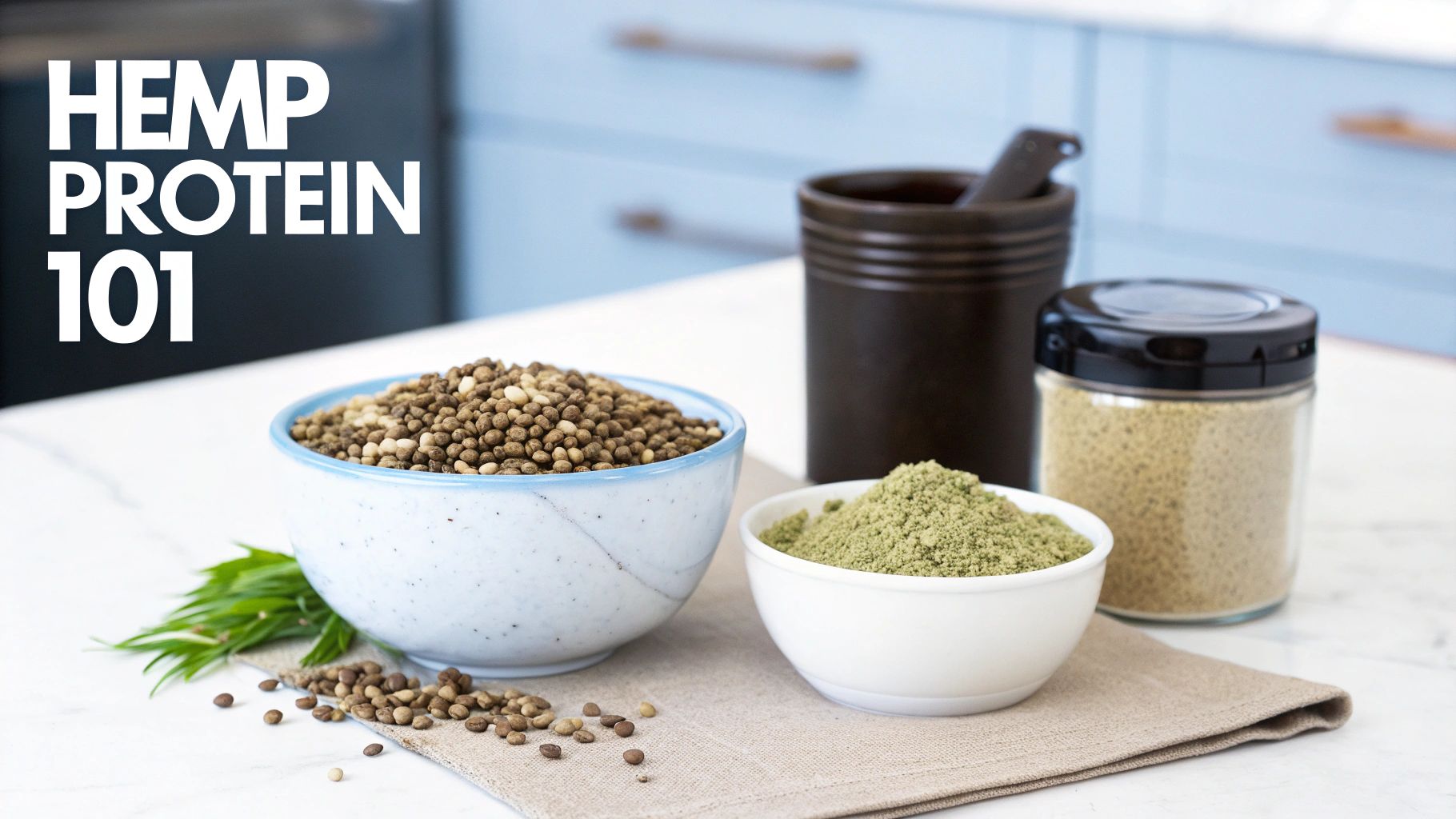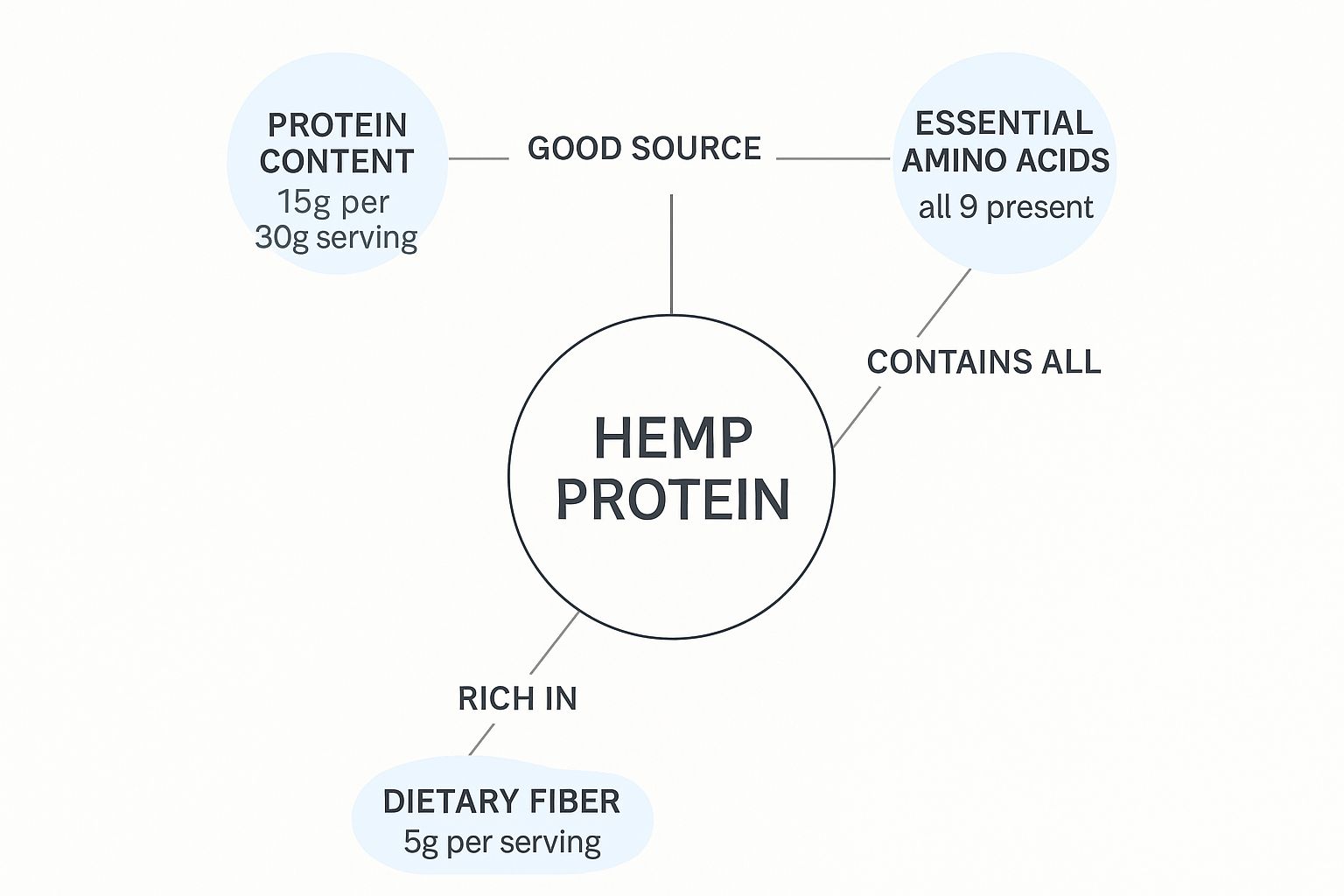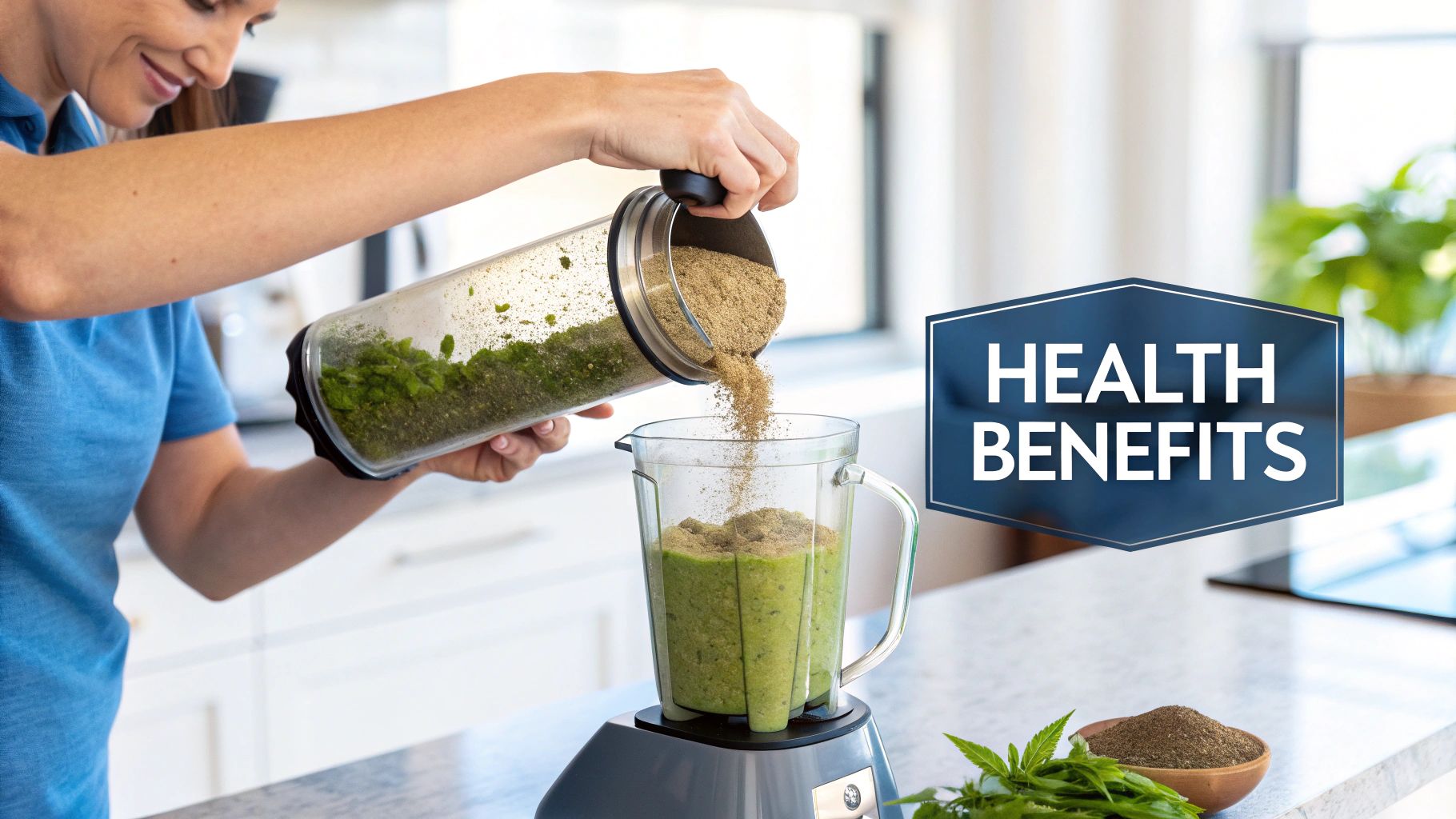Understanding Hemp Protein: Beyond The Marketing Buzz

Think of the plant-based protein aisle as a bustling neighborhood. Pea and soy protein are the popular kids, always getting attention. But quietly, down the street, lives hemp protein, offering a unique and often overlooked nutritional profile. Let’s clear up some common misconceptions, starting with the biggest one: hemp protein won't get you high, even though it comes from the same plant family as marijuana.
How does that little hemp seed transform into the powder in your smoothie? It's a fascinating process. The seeds are cold-pressed, squeezing out the valuable hemp oil. What’s left is a nutrient-packed "cake." This cake is then milled into a fine powder, creating the hemp protein you see on store shelves. This gentle process preserves the good stuff: fiber, healthy fats, and minerals.
Hemp Protein: A Sustainable Choice
This sustainable protein source is gaining traction with nutritionists and fitness buffs alike. Why? Because compared to animal-based protein, hemp has some serious environmental perks. It's remarkably water-efficient, especially when compared to other plant-based sources like almonds. To put this into perspective, producing 1 kilogram of hemp protein might require a mere 300–500 liters of water. Whey or almond protein, on the other hand, could gulp down 3,000–5,000 liters. Want to learn more about its sustainability and health benefits? Learn more about hemp protein's health benefits
This focus on sustainability resonates with the growing consumer demand for eco-friendly foods. Plus, hemp's ability to grow in various climates makes it a versatile crop worldwide. This positions hemp protein as a potential key player in feeding a protein-hungry planet. So, is hemp protein actually good for you? Let's dig into its nutritional profile and uncover its true potential.
The Complete Protein Mystery: What Sets Hemp Apart

This infographic gives us a snapshot of hemp protein’s nutritional highlights. Notice the interplay between the protein content, the essential amino acids, and the fiber. With 15g of protein per 30g serving, all nine essential amino acids, and 5g of dietary fiber, hemp protein packs a nutritional punch, especially for those following a plant-based diet.
So, what exactly does "complete protein" mean? Think of your body as a builder constructing a house. Amino acids are the bricks, and you need a variety to build a strong, functional structure. Many plant proteins are like a brick set missing a few key pieces. Hemp protein, however, supplies all nine essential amino acids—the ones your body can’t produce on its own. It's like having a complete building set ready to go. This is a big deal, especially if you're avoiding animal products, typically seen as the go-to for complete protein.
Hemp's Amino Acid Advantage
Hemp protein stands out in the plant-based world because it's a complete protein source, providing all nine essential amino acids vital for our health. This is a rarity among plant proteins. For the science-minded, approximately 82% of hemp protein is edestin, 13% is albumin, and 5% is β-conglycinin. Want to dive deeper into the specifics? Learn more about hemp protein's nutritional profile. This well-rounded amino acid profile gives hemp a distinct edge over other plant-based options like pea, rice, or soy protein, which often fall short on one or more essential amino acids.
Digestibility and Bioavailability: Putting Protein to Work
Having the right amino acids is essential, but it's only part of the equation. Your body also needs to effectively use them. This is where digestibility and bioavailability enter the picture. Imagine having a toolbox packed with tools (your amino acids), but if you can’t access or use them efficiently, they're not very helpful. Hemp protein has good digestibility, meaning your body can easily break it down and absorb those valuable amino acids.
To better understand the comparison of Hemp Protein with other plant-based protein sources, the following table offers a helpful overview. It details the amino acid profiles, digestibility scores, and overall nutritional completeness across several popular options.
Hemp Protein vs Other Plant Proteins: Complete Amino Acid Comparison
| Protein Source | Complete Protein | PDCAAS Score | Key Amino Acids | Digestibility |
|---|---|---|---|---|
| Hemp Protein | Yes | 0.49-0.66 (estimated) | All 9 essential amino acids, rich in arginine & histidine | Good |
| Pea Protein | No | 0.65-0.75 | Lysine, arginine | Good |
| Brown Rice Protein | No | 0.47-0.54 | Lysine, methionine | Moderate |
| Soy Protein | Yes | 0.91-1.00 | All 9 essential amino acids | Good |
Note: PDCAAS (Protein Digestibility Corrected Amino Acid Score) is a method for evaluating protein quality. As you can see, while hemp protein might not have the highest PDCAAS score, it does offer the complete essential amino acid profile, a crucial factor for overall health.
Hemp Protein's Versatility: Benefits for Everyone
Whether you're a dedicated athlete, a busy parent, or simply aiming for a healthier lifestyle, hemp protein offers a variety of benefits. Athletes can utilize the complete protein for muscle repair and recovery after intense workouts. Busy parents can appreciate how quickly and easily it blends into smoothies or snacks. And for anyone focused on improving their nutrition, hemp protein’s fiber content promotes healthy digestion and gut health. This versatility makes it a valuable addition to any diet.
Real Health Benefits: What Research Actually Reveals

So, you're curious about hemp protein, and rightfully so. There's a lot of buzz, but let's cut through the marketing hype and get to the real story backed by science. The benefits of hemp protein aren't about overnight transformations, but about offering solid nutritional support for your overall well-being.
Heart Health: A Deeper Dive
One area where hemp protein truly stands out is heart health. And it's not just about the protein itself. Hemp protein has a remarkable fatty acid profile, packed with omega-3s and omega-6s. Think of these essential fats as tiny bodyguards for your heart and blood vessels, helping to keep cholesterol levels and blood pressure in check. It’s like getting a heart-healthy bonus with your protein boost. These benefits contribute to a lower risk of cardiovascular disease.
Digestive Support: The Fiber Factor
Another perk of hemp protein that often gets overlooked is its fiber content. Unlike many protein powders that are highly processed and stripped of nutrients, hemp protein retains a good amount of fiber from the hemp seed. This fiber acts like a friendly helper in your gut, promoting healthy digestion and a happy gut microbiome. A typical serving can add a significant boost to your daily fiber intake, keeping things moving smoothly. For more information on the benefits of hemp protein, check out this article: Unlocking the Power of Hemp Protein: 10 Health Benefits You Need to Know
Antioxidant Power: Exploring the Possibilities
Beyond protein, healthy fats, and fiber, researchers are delving into the antioxidant potential of hemp protein. Antioxidants are like your cells' personal defense squad, protecting them from damage caused by unstable molecules called free radicals. These free radicals are linked to a variety of health problems. While research is still in progress, early studies hint that hemp protein might help your body’s natural defense system against this oxidative stress, providing extra protection beyond basic nutrition.
Managing Expectations: The Reality of Results
It's important to remember that no single food is a miracle cure. Hemp protein offers several potential health advantages, but individual experiences can vary. Your overall diet, lifestyle, and current health status all play a role. For example, someone with existing digestive troubles might notice a bigger difference from the fiber in hemp protein than someone with a perfectly healthy gut.
Patience and Progress: A Realistic Timeline
Don't expect instant results. Like any change to your diet, incorporating hemp protein takes time. Your body needs time to adjust, and you need time to experience the full effects. Be patient, stay consistent with your intake, and listen to your body. Some people notice improved digestion within days, while others may take a few weeks to see changes. Think of hemp protein as part of a balanced approach to nutrition, not a replacement for a healthy diet overall.
Let's take a closer look at some of the potential health benefits and the research behind them:
Hemp Protein Health Benefits: Evidence-Based Overview
| Health Benefit | Scientific Evidence | Study Type | Confidence Level | Practical Impact |
|---|---|---|---|---|
| Heart Health (Cholesterol & Blood Pressure) | Studies on omega-3 and -6 fatty acid effects | Observational & Clinical Trials | Moderate to High | Can contribute to improved cardiovascular health |
| Digestive Health (Regularity & Gut Microbiome) | Research on fiber and gut health | Observational & Preclinical | Moderate | Can support healthy digestion and gut function |
| Antioxidant Protection (Cellular Health) | Emerging research on antioxidant properties | Preclinical & In Vitro | Low to Moderate | Potential for protecting cells from oxidative stress |
This table summarizes current research on the health benefits of hemp protein. While some areas have strong evidence, others are still being explored. It’s always a good idea to discuss any dietary changes with your doctor or a registered dietitian.
Potential Drawbacks: Who Should Think Twice
Hemp protein boasts a powerful nutritional punch, but it's not a one-size-fits-all solution. Just like any food, it has potential downsides we need to explore. Is hemp protein right for you? Let’s dive in and find out.
Digestive Adjustments: Easing into Fiber
Think of fiber as a helpful guest in your digestive system. While its presence ultimately benefits your gut, it can cause a little commotion at first. Similar to introducing a new food into your diet, hemp protein, being rich in fiber, might initially lead to mild bloating or gas for some people. This isn't usually a cause for concern; it's simply your system adjusting. The solution is to introduce hemp protein gradually. Start with a small amount and slowly increase your intake as your body adapts.
Taste and Texture: An Acquired Preference
Hemp protein has a unique earthy, slightly nutty flavor. Some people love it, others… not so much. It's also worth noting that hemp protein can have a somewhat gritty texture, especially compared to heavily processed protein powders. If you're used to the smooth sweetness of typical protein shakes, hemp's natural taste and texture might take a little getting used to. While hemp offers plenty of benefits on its own, you can boost its effects and perhaps mask the taste by blending it with other nutritious foods. For example, combining it with some of the best foods for hair growth could create a powerful and delicious combination.
Medical Considerations and Interactions
Before adding hemp protein to your diet, it's crucial to talk to your doctor, especially if you have any existing health conditions or are currently taking medication. While hemp protein is generally safe, it can potentially interact with certain medications, particularly those that affect blood clotting. Doing your research is always a good idea, and a resource like Possible Side Effects of Hemp Protein: What You Need to Know can offer valuable insights. This ensures you're making informed decisions about your health.
Practical Concerns: Quality and Testing
Not all hemp protein is created equal. Quality varies considerably between brands, so it's essential to be discerning. Seek out certified organic products from trusted companies that are transparent about their sourcing and processing methods. Drug testing is another factor to consider. While hemp protein contains only trace amounts of THC (the psychoactive component in marijuana), some highly sensitive drug tests might still pick it up. If you're subject to drug testing at work, it's wise to exercise caution and discuss it with your employer beforehand.
Starting Slowly: Finding Your Optimal Intake
Ease into your hemp protein journey. Begin with smaller serving sizes and gradually increase the amount as your body adjusts. This gentle approach allows your digestive system to acclimate and helps you determine how well you tolerate hemp protein. If you experience any persistent digestive issues, try reducing your intake or switching to a different brand. Listening to your body is key.
Practical Usage: Making Hemp Protein Work For You

Ready to give hemp protein a try? Let's make sure your first foray is a good one. The secret to enjoying hemp protein is all about integrating it smoothly into your daily life. This means figuring out how to work with its particular taste and texture, and sidestepping any potential digestive hiccups.
Choosing the Right Hemp Protein
First and foremost, quality is paramount. Not all hemp protein powders are equal. Seek out certified organic options to steer clear of unwanted pesticides and herbicides. Transparency is essential, so opt for brands that openly share their sourcing and processing methods. A bit of research upfront can save you from a lot of hassle down the line. This is especially true when you're trying to figure out if hemp protein is a good fit for you.
Masking the Earthy Flavor
Some people relish the earthy, nutty flavor of hemp protein. Others? Not so much. If you're in the latter group, no worries! There are plenty of tricks to either mask or complement that distinct flavor.
- Smoothie Superstar: Whirl hemp protein into your go-to smoothie. Fruits like bananas, berries, or mangoes can easily overpower the earthiness.
- Baking Essential: Hemp protein can be surprisingly flexible in baking. Toss it into muffins, pancakes, or even homemade energy bars. The other ingredients will help balance out the flavor. You could even use it in a specific bar mix, like the SuperSEED Protein Bar Mix, which blends perfectly with other seeds for a well-rounded protein source.
- Savory Secret Weapon: A sprinkle of hemp protein can add a nutritional punch to savory dishes, like soups or stews. The earthy undertones can actually enhance certain flavors.
Serving Sizes and Timing: Finding Your Sweet Spot
Begin with a small serving size, around 1-2 tablespoons, and gradually increase it as your body adapts. This helps prevent any potential digestive upset. The ideal time to consume hemp protein truly depends on your objectives.
- Pre-Workout Energy Boost: Hemp protein can deliver sustained energy for your workouts.
- Post-Workout Muscle Recovery: It aids in muscle repair and recovery after you exercise.
- Anytime Snack Support: Hemp protein can be mixed into snacks to keep you feeling full and content between meals.
Pairing and Storage: Maximizing Freshness and Benefits
Hemp protein plays well with other healthy foods and supplements. Combining it with fruits, vegetables, and healthy fats can create a well-balanced meal or snack. Proper storage is also vital to maintain its freshness. Store your hemp protein in an airtight container in a cool, dry place, away from direct sunlight. This will preserve its nutritional value and prevent it from spoiling.
Troubleshooting Tips for Beginners
- Digestive Issues: If you experience bloating or gas, try decreasing your serving size or upping your water intake.
- Taste Preferences: Don’t be afraid to experiment with different flavor pairings until you discover what appeals to your palate.
- Texture Troubles: If you find the texture gritty, try blending the hemp protein with liquids first before adding it to other foods. This will create a smoother consistency.
By following these practical suggestions, you can successfully incorporate hemp protein into your diet and reap its numerous health benefits. Keep in mind, the key is to start slowly, pay attention to your body’s signals, and discover what works best for you.
Hemp Vs. Other Proteins: Making The Right Choice
So, you're standing in the supplement aisle, staring down a wall of protein powders. Whey, casein, soy, pea, rice, hemp…it's a protein party, and everyone's invited. But how do you choose? Let's dive into how hemp protein compares to the usual suspects, focusing on real-world experience instead of marketing hype. For a comprehensive comparison, check out our guide on hemp protein vs. other protein powders.
Cost-Effectiveness and Sustainability: Long-Term Value
Think of it like this: sometimes, the cheapest option upfront isn't the best investment in the long run. While hemp protein might appear more expensive than some alternatives initially, hemp is a remarkably sustainable crop. It needs less water and fewer resources than many other protein sources. This eco-friendly approach is good for the planet, and that's a value you can't put a price tag on. Plus, hemp protein often comes loaded with extra nutrients like fiber and healthy fats, which could mean fewer supplements and more value over time.
Taste, Texture, and Mixability: Everyday Practicalities
Let's be honest, taste matters. Hemp has a distinctive earthy, slightly nutty flavor. Some people love it, some...not so much. And yes, the texture can be a little gritty compared to those super-processed powders. But here's the thing: hemp protein blends surprisingly well into smoothies. The taste is easily masked with fruits or other flavorful ingredients. Think of it as a blank canvas for your smoothie creativity.
Hemp Protein vs. Whey: Plant-Based Power vs. Dairy Staple
Whey protein, derived from milk, is famous for its rapid absorption and high leucine content, making it a gym-goer favorite. But if you're lactose intolerant or vegan, whey is off the table. Hemp protein provides a plant-based alternative with a complete amino acid profile, although its absorption is a bit slower.
Hemp Protein vs. Casein: Sustained Release Showdown
Casein, another milk protein, digests slowly, providing a steady stream of amino acids. It's often the protein of choice for nighttime recovery. Hemp protein, thanks to its fiber content, offers a similar sustained release. This makes it a potential dairy-free option for overnight muscle repair.
Hemp Protein vs. Soy: Navigating Allergies and Preferences
Soy protein is a complete plant-based protein, but it's also a common allergen. Hemp protein offers a hypoallergenic choice for those with soy sensitivities. Plus, some people simply prefer hemp's earthy flavor to soy's sometimes less appealing taste.
Hemp Protein vs. Pea and Rice: Completing the Puzzle
Pea and rice protein are popular plant-based choices, but they often lack certain essential amino acids. Hemp protein, being a complete protein, can be a valuable addition to these, creating a more balanced amino acid profile. It’s like adding the missing piece to a nutritional jigsaw puzzle.
Choosing the Right Protein for Your Needs
The "best" protein isn't a one-size-fits-all answer. It truly depends on your individual goals, dietary needs, and preferences. Are you an athlete seeking rapid muscle recovery? Whey or casein might be your best bet. Vegan or lactose intolerant? Hemp, soy, pea, or rice protein offer plant-based solutions. If sustainability and whole-food nutrition are your priorities, hemp protein shines. And sometimes, the best approach is combining different protein sources to get the perfect blend of benefits.
Your Hemp Protein Decision: Putting It All Together
After exploring the science, benefits, and practicalities of hemp protein, let's see if it's the right fit for your nutritional needs. This isn't about following the latest fad; it's about figuring out what truly works for you.
Evaluating Your Individual Needs
Think of your nutrition plan like a personalized map. Your destination? Your health goals. Hemp protein might be the vehicle to get you there. Consider these factors:
-
Dietary Goals: Are you trying to boost your protein intake, embrace a plant-based lifestyle, or address specific nutritional gaps? Hemp protein can be a flexible tool for various dietary objectives.
-
Taste Preferences: Let's be honest, if you don't like the taste, you won't stick with it. Try different flavors and recipes. See if hemp protein’s earthy undertones appeal to you.
-
Budget: Hemp protein can be a bit pricier than other options. Do the added nutritional benefits justify the cost for your budget?
-
Lifestyle: Always on the go? Hemp protein is easy to add to smoothies or sprinkle on snacks, making it convenient for busy schedules. Think about how hemp protein fits into a balanced lifestyle. How does it compare to other protein sources? You can even find articles on broader lifestyle topics, like how to style clothes, to help you see the bigger picture.
-
Digestive Health: If you have a sensitive stomach, start slowly with hemp protein. The fiber, while good for you, might require an adjustment period.
Starting Safely and Setting Expectations
Like any dietary change, begin with a small serving of hemp protein, maybe 1-2 tablespoons. Gradually increase the amount as your body adjusts. Be patient. Don't expect immediate changes. Pay attention to how your body feels, and adjust your intake as needed.
Recognizing Signs of Success
How can you tell if hemp protein is working for you? Here are a few indicators:
-
Improved Digestion: Some people experience more regular bowel movements and less bloating thanks to the fiber in hemp protein.
-
Sustained Energy: Hemp protein can offer a consistent energy release, helping you feel full and focused between meals.
-
Enhanced Muscle Recovery: If you’re active, you might notice faster muscle recovery after exercise.
-
Overall Well-being: Sometimes, the best sign is simply feeling better overall.
Adjusting Your Approach: Combining Protein Sources
Hemp protein might work best alongside other protein sources. Think of it like creating a balanced meal. Hemp’s complete protein profile complements other plant-based proteins, like pea or rice protein, ensuring you receive all the essential amino acids.
Ongoing Support: Resources for Your Journey
Your protein journey is just beginning. Many resources can support you. A registered dietitian can offer personalized advice. Online communities and support groups are great places to share experiences and tips. Embrace the learning process. Finding what works for your body is an ongoing exploration.
Making smart health decisions is a continuous journey. As you learn more, think about your overall lifestyle choices and how they impact your well-being.
Ready to try clean, plant-based protein? Explore Cantein's premium hemp protein products at https://www.cantein.com. We offer organic hemp protein powder, perfect for adding to smoothies, baking, and more. Fuel your body with real food, backed by science, and designed for your life.

